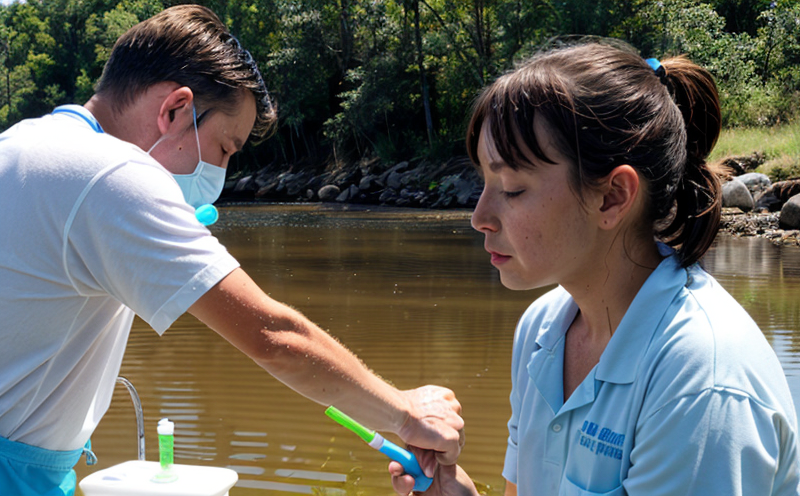ISO 7899-2 Enterococci Enumeration Test in Water
The ISO 7899-2 standard provides a detailed protocol for enumerating Enterococcus faecalis and Enterococcus faecium in water. This method is crucial for ensuring public health and environmental safety, particularly in water quality testing aimed at detecting fecal contamination. The test involves multiple steps, including sample collection, preparation, inoculation onto specific media, incubation, and final count of colonies.
The process begins with the collection of water samples from various sources such as surface water, drinking water, or industrial wastewater. Proper sampling is critical to ensure accurate results. Once collected, these samples are transported to a laboratory for analysis within specified time frames to prevent degradation or contamination. Sample preparation typically includes dilution and plating onto M-TCBS (Mug-1 agar with Tetracycline and Bromothymol Blue) plates.
The M-TCBS medium is designed specifically for the selective isolation of enterococci by virtue of its pH sensitivity. As colonies grow on this media, they exhibit a characteristic pink color under certain conditions which aids in their identification. After inoculation and incubation at 35°C ±1°C for 24 to 48 hours, the number of Enterococcus colonies can be counted manually.
The enumeration method described by ISO 7899-2 ensures precision and consistency across different laboratories. This standard helps in maintaining uniformity in microbial testing practices worldwide, thereby facilitating easier comparisons between results from various sources or jurisdictions.
This test is widely used not just for drinking water but also for recreational waters like lakes, rivers, and beaches to monitor potential health risks associated with high levels of enterococci. By adhering to this standard, laboratories can provide reliable data that informs regulatory decisions regarding water quality standards.
For instance, in the case of a beach closure due to excessive bacterial contamination, knowing the exact number of Enterococcus cells present allows for more informed mitigation strategies. Similarly, municipalities using this test help ensure their drinking water meets stringent health guidelines set by organizations such as WHO or EPA.
The ISO 7899-2 procedure is well-suited not only for regulatory compliance but also supports research efforts aimed at understanding the impact of environmental factors on microbial growth patterns in aquatic systems. Understanding these dynamics can lead to better management practices that protect both human health and aquatic ecosystems.
Applied Standards
The ISO 7899-2 Enterococci Enumeration Test is based on the internationally recognized ISO 7899-2:2014. This standard has been developed through rigorous validation processes involving multiple laboratories across diverse geographical regions. It ensures that tests conducted follow consistent procedures, leading to more accurate and reproducible results.
Other relevant standards include ISO 11141-1:2015, which deals with the enumeration of coliform bacteria in water, and ISO 11141-2:2016 for heterotrophic plate count. While these standards focus on different aspects of water quality testing, they complement each other by providing a comprehensive approach to assessing microbial content in aquatic environments.
The use of international standards like ISO ensures that the methodologies employed are scientifically sound and globally acceptable. This standardization facilitates better communication among stakeholders involved in water management projects, from government agencies overseeing public health policies to private companies responsible for maintaining industrial wastewater treatment facilities.
Eurolab Advantages
At Eurolab, we leverage our extensive experience and state-of-the-art facilities to offer unparalleled expertise in ISO 7899-2 compliance testing. Our team of qualified professionals ensures that every aspect of the test adheres strictly to international guidelines, delivering accurate results consistently.
- Accurate Results: Utilizing advanced microbiological techniques and strict adherence to ISO standards guarantees precise enumeration of enterococci in water samples.
- Detailed Reporting: Comprehensive reports are provided which include raw data alongside interpretations, helping clients make informed decisions about their water quality issues.
- Timely Delivery: Our efficient laboratory processes ensure quick turnaround times without compromising on accuracy or reliability of results.
In addition to these core advantages, Eurolab also offers customized training programs and consultancy services related to water quality testing. These offerings cater specifically to the needs of our clients, whether they are small businesses looking for basic compliance checks or large corporations aiming at advanced research projects.
Our commitment to excellence extends beyond just meeting regulatory requirements; we strive to contribute towards sustainable development goals by providing reliable data that informs effective management practices in water resource conservation and protection against pollution.
Environmental and Sustainability Contributions
- Water Quality Improvement: Accurate enumeration of enterococci helps identify sources of contamination promptly, allowing for targeted interventions to improve overall water quality.
- Public Health Protection: By monitoring fecal indicator bacteria levels in recreational waters and drinking supplies, we help safeguard public health from potential pathogens.
The ISO 7899-2 test plays a vital role in maintaining ecological balance by ensuring that industrial discharges do not exceed permissible limits set forth by environmental regulations. This contributes significantly to preserving aquatic biodiversity and supporting sustainable development initiatives globally.
Through our commitment to high-quality testing services, Eurolab actively participates in promoting cleaner water bodies, safer drinking supplies, and healthier ecosystems worldwide.





